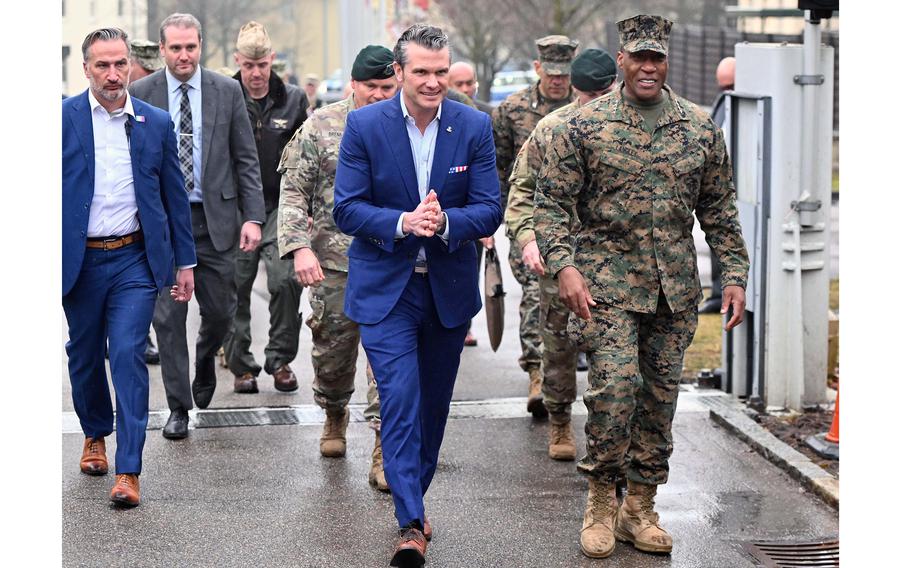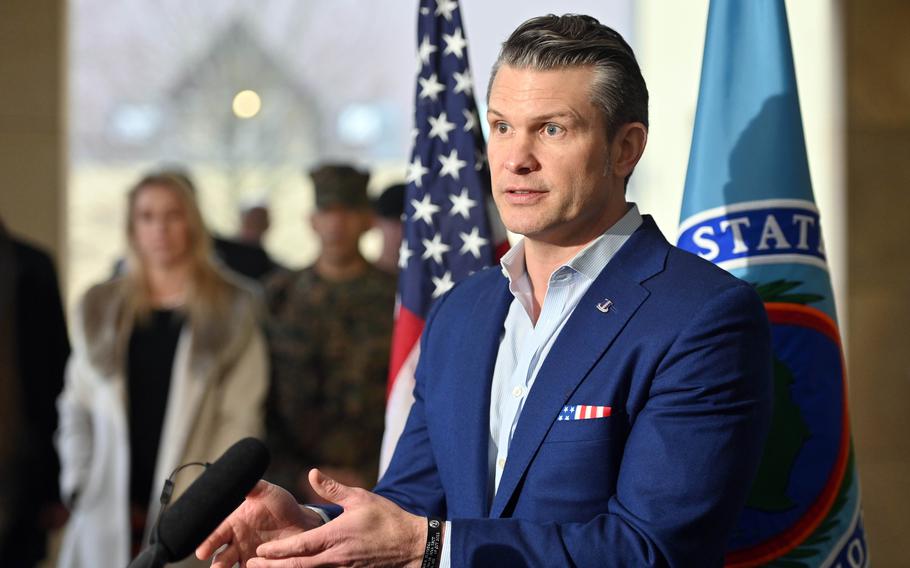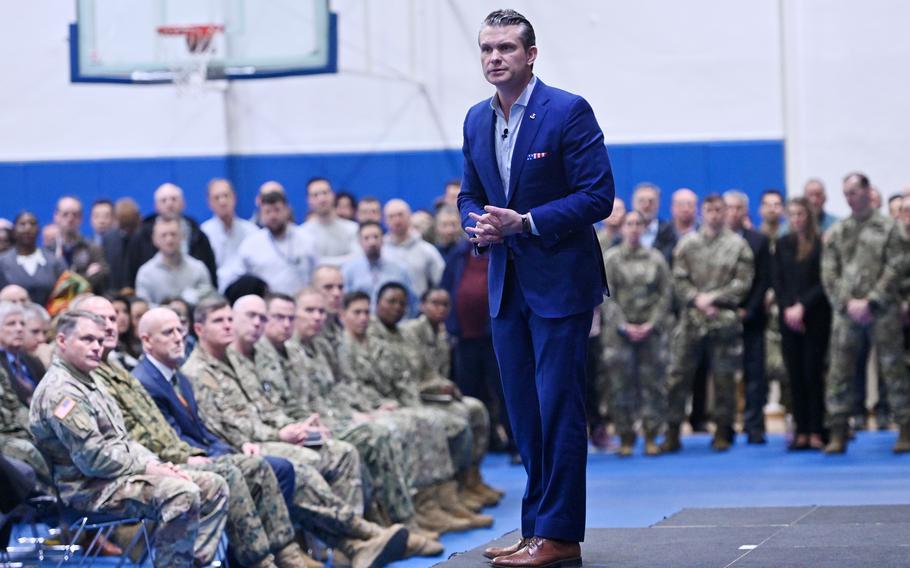
Defense Secretary Pete Hegseth walks with Gen. Michael Langley, commander of U.S. Africa Command, following a town hall meeting at AFRICOM headquarters in Stuttgart, Germany, Feb. 11, 2025. (Michael Abrams/Stars and Stripes)
STUTTGART, Germany — Defense Secretary Pete Hegseth started his day here Tuesday lifting weights with Green Berets and ended it by giving special recognition to a U.S. Africa Command team that assisted with a recent airstrike on Islamic militants in Somalia.
The Pentagon chief, on his first international trip in his new job, met with rank-and-file troops and two combatant commanders for high-level briefings on threats ranging from militants in Africa to Russia’s war in Ukraine.
“No offense, general,” Hegseth told AFRICOM’s Gen. Michael Langley during a news conference. “I probably connect more with those guys (young troops) than I do with four-star generals.”
Hegseth’s stop in Stuttgart, home to AFRICOM and U.S. European Command headquarters, came ahead of meetings with NATO allies in Brussels, where Hegseth said he will deliver President Donald Trump’s message that allies need to step up defense spending.
In Europe, there is uncertainty about the America’s future troop commitment on the Continent. At the end of Trump’s first term, he sought to pull 12,000 troops out of Germany in frustration over Berlin’s low levels of military spending.

Defense Secretary Pete Hegseth talks with reporters in front of U.S. Africa Command headquarters in Stuttgart, Germany, Feb. 11, 2025, following a town hall meeting with service members. (Michael Abrams/Stars and Stripes)
Concerns over China have raised the prospect of shifting more Pentagon capabilities to the Pacific.
However, Hegseth said Tuesday that it’s too early to talk about pulling forces from Europe.
“There are no plans right now in the making to cut anything,” Hegseth told reporters at the end of his stop in Stuttgart. “There is an understanding that we’re going to review force posture across the world.”
The same is the case for the AFRICOM mission in Somalia, Hegseth said. There are now several hundred U.S. special operations troops working with local forces in their long-running campaign against the al-Shabab group and other militants.
At the end of Trump’s first term, he withdrew American forces from the country, but they were later sent back in by President Joe Biden. The rationale at the time was that militants were gaining ground without the constant U.S. presence.
“I want to listen to commanders on the ground first and foremost, as does the president,” Hegseth said of the Somalia mission.
Hegseth said he would seek to carry out counterterrorism missions in the most effective way but also look to capitalize on remote intelligence capabilities to keep threats in check.
He cited the Feb. 1 airstrike against Islamic State fighters in Somalia, the first since Trump’s return to office, as an example.

Defense Secretary Pete Hegseth speaks to troops at U.S. Africa Command in Stuttgart, Germany, Feb. 11, 2025. (Michael Abrams/Stars and Stripes)
Trump has “been very clear that we’re not trying to have American boots all over the globe where we can do counterterrorism effectively over the horizon,” Hegseth said. “That’s the preference. But we’ll review the force posture (in Somalia.)”
Hegseth added that he considers AFRICOM’s role critical.
“That’s a mission very much worth resourcing,” he said. “Africa is very much on the front lines of a fight from Islamists to Christian populations that are under siege in Africa and have been ignored for far too long.”
Less than a month into the job, Hegseth has made quick changes to the Defense Department, many of them geared toward eliminating military programs on cultural issues such as diversity, equity and inclusion.
Other measures have involved the elimination of identity-related events, such as Black History Month. Hegseth has argued that such programs are divisive.
He echoed those views during a town hall meeting with troops in which he said his focus is on building a stronger “warrior ethos” in the military.
“And that means what unites us in our shared purpose is a lot more important than what might make us different. We all have the same uniform. We all bleed red,” he said.
En route to Stuttgart on Monday, Hegseth also signed an order that turns Fort Liberty in North Carolina back into Fort Bragg, making a change that honors a World War II private 1st class who was awarded a Silver Star, rather than a Confederate general.
“It’s about that legacy. It’s about the connection to the community, to those who served,” Hegseth said. “And we’re not done. There are many other bases that have been renamed that erodes that very same legacy.”